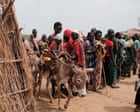
In a complex tapestry of events across the Middle East, recent developments have highlighted ongoing conflicts and humanitarian predicaments, showcasing the intricate balance of peace efforts and tensions in the region. Guided by a spirit of clarity, we delve into these pressing matters.
The tranquil everyday life has been starkly disrupted in Sudan’s North Kordofan state. Recent raids conducted by the Sudanese paramilitary Rapid Support Forces (RSF) have resulted in nearly 300 casualties. These tragic occurrences mark this region as a crucial frontline in a prolonged civil war with the Sudanese army, a conflict persisting since April 2023. Reports from human rights organizations underscore the absence of military objectives at the sites of these attacks, intensifying the humanitarian concern surrounding the situation due to arbitrary violence impacting civilian life.
Transitioning to Syria, a sequence of military interventions by Israel has drawn international attention and mediation efforts. Israel’s military involvement, concentrated on Damascus and the Druze-majority city of Sweida, was reportedly aimed at curbing clashes between the Syrian government forces and Druze fighters. The strikes resulted in casualties, including one fatality and injuries to eighteen individuals. In a reassuring gesture, Syrian interim president Ahmed al-Sharaa acknowledged the timely intervention of American, Arab, and Turkish mediators, which helped avert further escalation of hostilities.
Furthermore, a ceasefire deal has been reached between the Syrian government and Druze leaders in Sweida, marking a hopeful pause in what has been described as the deadliest violence in recent months. This agreement stems from extensive dialogue and is a testament to ongoing efforts to establish stability amidst the complexities of military and community dynamics in the area.
The broader regional tensions are further complicated by the European Union’s (EU) stance regarding ongoing hostilities involving Israel and Palestinian territories. The EU has faced severe critiques from organizations such as Amnesty International for what has been described as a “cruel and unlawful betrayal” of Palestinian rights due to the bloc’s reluctance to impose sanctions on Israel amidst conflict in Gaza and enduring violence in the West Bank. These rebukes spotlight ongoing ethical debates within international bodies regarding conflict resolution and humanitarian responsibility.
Amidst these contentious scenarios, the overarching narrative is one of the fragile balance held by diplomatic interventions, ceasefire agreements, and international oversight aimed at reducing loss of life and promoting peace. The evolving dynamics within Sudan and Syria, along with international responses, reflect the intricate layers of politics, diplomacy, and human rights at play in the broader Middle East and highlight the global community’s role in nurturing peace and safeguarding human dignity amidst conflict.
Source: {link}
